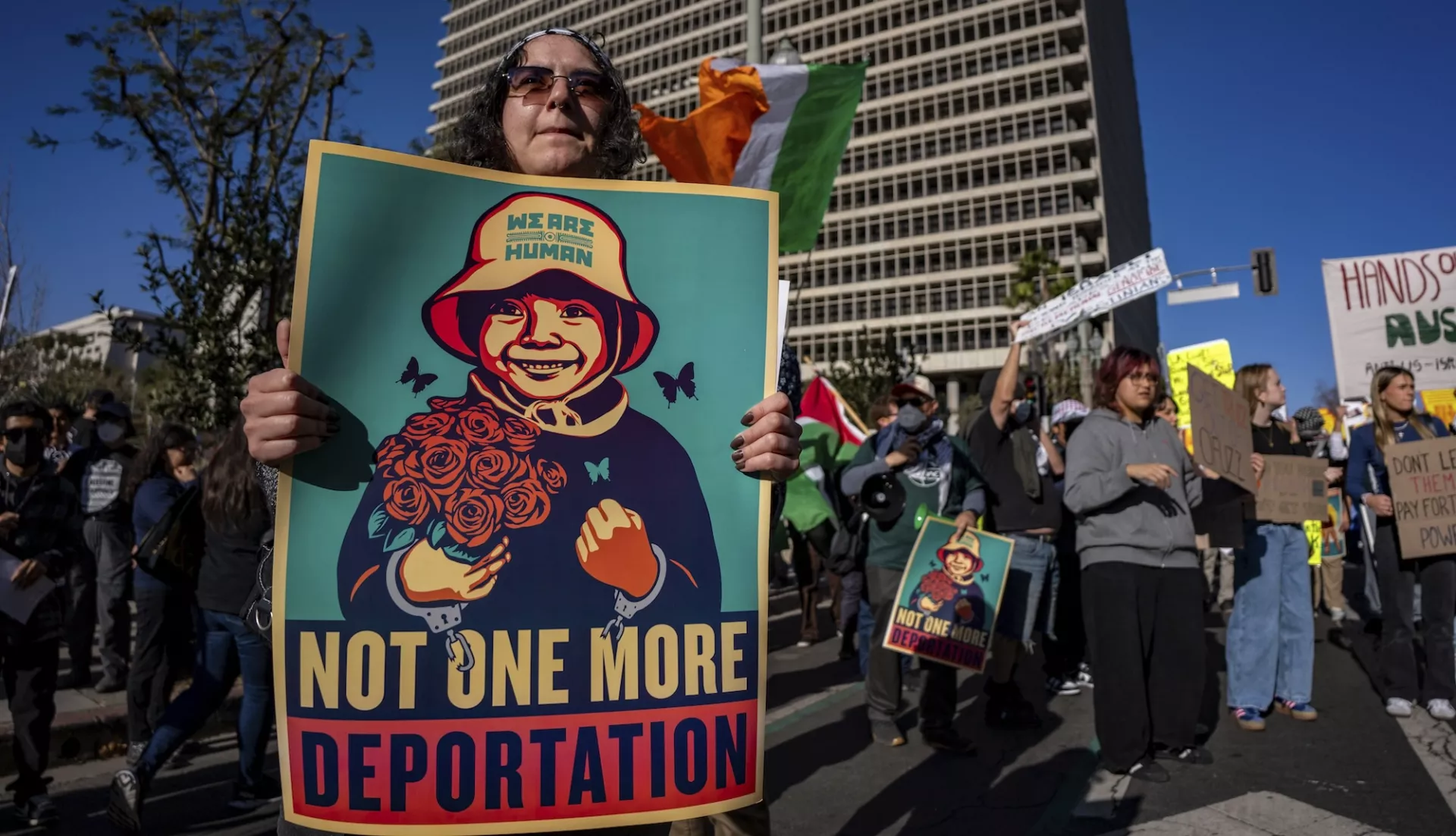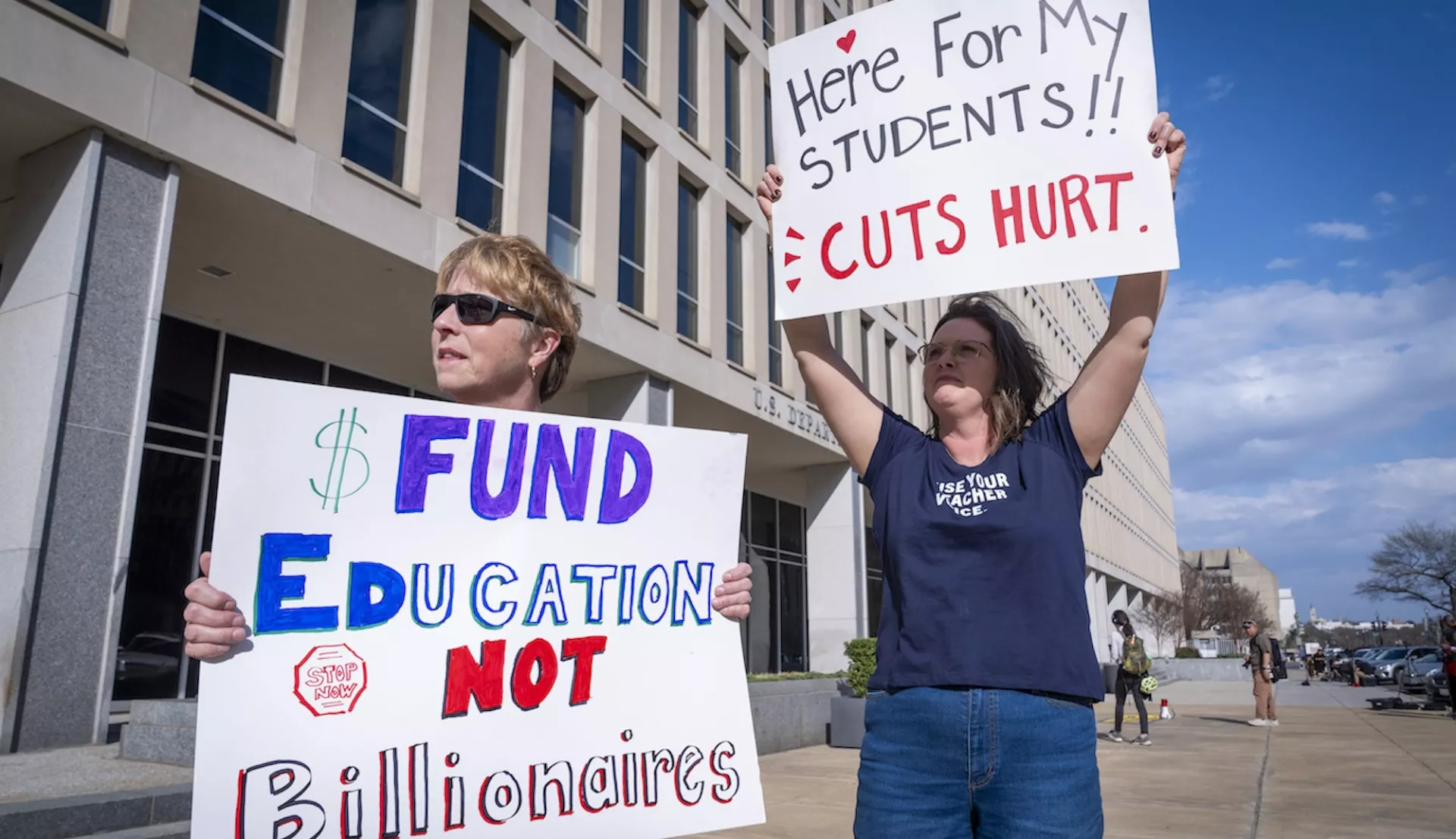Key Takeaways
- President Donald Trump’s return to the White House has fueled harsh anti-immigrant laws in states like Texas, Iowa, and Oklahoma.
- Civil rights groups are challenging these laws as unconstitutional.
- NEA is taking a firm stand to protect immigrant students and educators, using its power and resources to ensure public schools remain safe and inclusive for all.
During his first term, President Donald Trump enforced harsh and terrorizing policies to crackdown on immigrants—enacting measures that focused on mass deportations, militarized borders, and expanded federal enforcement. His actions signaled to some elected officials, like Texas Gov. Greg Abbott, Oklahoma Gov. Kevin Stitt, and Iowa Gov. Kim Reynolds, that they had a green light to pass their own harsh anti-immigrant laws.
With Trump back in the White House and his continued push for some of the most draconian immigration policies in recent history, NEA is taking a public stand against his administration’s punitive and terrorizing immigration agenda.
"We are union members, and we know the power that comes from solidarity," said NEA President Becky Pringle. "Unions exist for moments like this. We, the NEA, will always fight like hell when people come for our kids, our professions, and our communities."
State Laws that Trigger Community Harm
Texas’s Senate Bill 4, enacted in December 2023, enables state and local officials to arrest individuals solely based on immigration status and empowers state judges to issue deportation orders. Oklahoma and Iowa quickly followed similar laws. These laws do more than target people with the courage and tenacity to move for a better life—they seek to criminalize their very existence.
Laws like these are "deeply harmful to Iowa families and communities,” said ACLU of Iowa legal director Rita Bettis Austen. “Iowa lawmakers knowingly targeted people who are protected by federal immigration laws and who are legally allowed to be here, like people granted asylum, or special visas given to survivors of domestic violence or other crimes.”
Several civil rights organizations, including the American Civil Liberties Union (ACLU) and the American Immigration Council, have filed lawsuits challenging immigration enforcement laws in Iowa and Texas.
Immigrants Targeted Despite Legal Status
The lawsuit challenging Iowa’s bill—Senate File 2340—features the story of “Anna,” an 18-year-old asylum recipient whose real name is being withheld for privacy. Anna was born in Honduras, where her father was murdered and her sister kidnapped. At age 14, she fled the country with her mother and entered the U.S. but was later deported.
Still fearing for her life, she re-entered the U.S. again, this time unaccompanied. She applied and received asylum and is now here lawfully, living with an Iowa family and attending high school.
But under Iowa’s anti-immigration law, Anna could be arrested and forcibly removed to the Mexican border—a place she has never lived and where she has no family or ties.
The lawsuit also includes the case of an Iowa immigrant identified as Jane Doe, a 68-year-old grandmother. A lawful permanent resident, Jane is originally from Mexico and has lived in the U.S. for several years.
Quote byBecky Pringle, NEA president

She first entered the country without authorization decades ago to join her husband, who became a lawful permanent resident in the 1980s. In 2005, Jane returned to Mexico after the death of her mother, but was detained when she attempted to come back to the U.S.
Her husband, then a U.S. citizen, petitioned for her return, but the application was still pending when he died. It wasn’t until 2022 that Jane was finally able to rejoin her family in Iowa with a valid green card.
Despite her legal status, under Iowa’s anti-immigrant law, she could still face arrest, imprisonment, or deportation.
“SF 2340 isn't just about so-called criminal reentry. It's a badly written law with far-reaching implications. It will create absolute chaos and human suffering in our legal system, and harm Iowa communities,” said Kate Melloy Goettel, legal director at the American Immigration Council.
Trump’s Constitutional Overreach
Measures such as those passed in Texas, Oklahoma, and Iowa violate the U.S. Constitution’s Supremacy Clause, which grants immigration authority exclusively to the federal government. The 2012 Arizona v. United States Supreme Court ruling remains the bedrock of that principle.
In the Texas and Iowa cases, the courts have agreed that the laws may violate this clause, and the federal appeals courts have so far maintained injunctions preventing the laws from being enforced while litigation continues.
However, the situation is different in Oklahoma, where a similar law—House Bill 4156—was initially blocked but is now in effect following the Trump administration’s decision to withdraw the federal government’s legal challenge. Advocacy organizations, like Padres Unidos de Tulsa, are exploring new legal avenues to challenge the law.
Fear on the Rise
Across the country, the fear generated by Trump’s immigration agenda is having an immediate and visible impact in communities and schools.
“Our community feels threatened,” said Ramiro Luna, co-founder and executive director of Somos Tejas, a Dallas-based nonprofit focused on Latino civic engagement. “While we’re doing our best to provide information and peace of mind, it’s incredibly difficult. People are afraid to come to any gathering—even to get basic necessities.”
In New York, for example, educators and advocates report that immigrant students are staying home due to growing fears of U.S. Immigration and Customs Enforcement (ICE) operations. Many families are afraid that showing at school could risk detention or deportation, resulting in a noticeable rise in absenteeism.
Early this year, in Denver, Colo., an immigration raid at an apartment complex led to dozens of students missing class the following day.
NEA Will Not Back Down
Trump’s return has emboldened the most extreme anti-immigrant factions in state legislatures—and the NEA is drawing a clear line: “NEA members will not stop,” said Pringle. “We can and will block bad policies. We can and will build broader coalitions to support the values and aspirations most Americans share.”
To that end, NEA has issued guidance that lays out information regarding immigration and schools, including information around enrollment issues, Plyler v. Doe, and Safe Zones resolutions, how educators can legally and safely engage in immigration advocacy, a FAQ around mass raids, a Know Your Rights guide around immigration enforcement, and an update on the DACA program.





